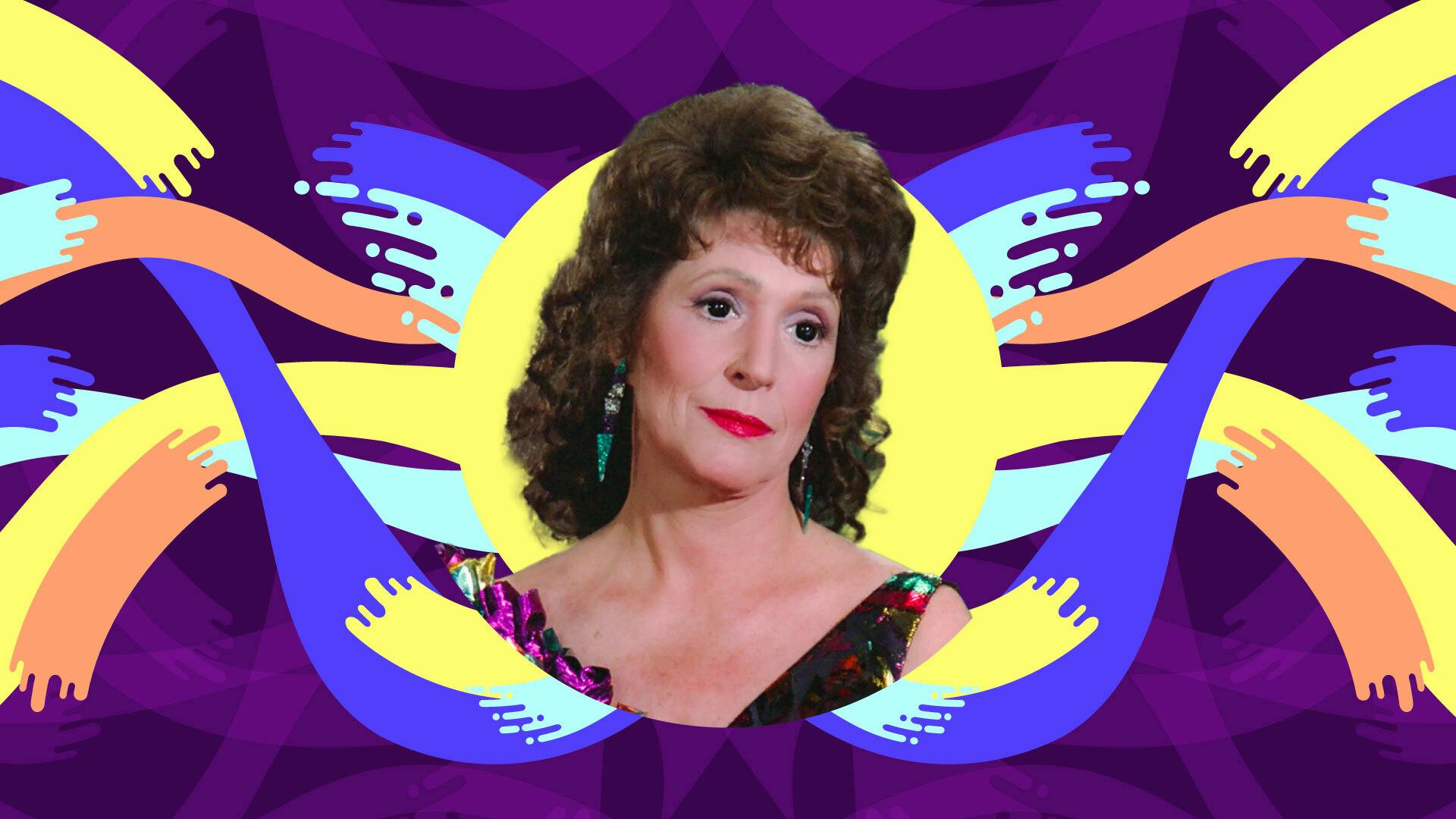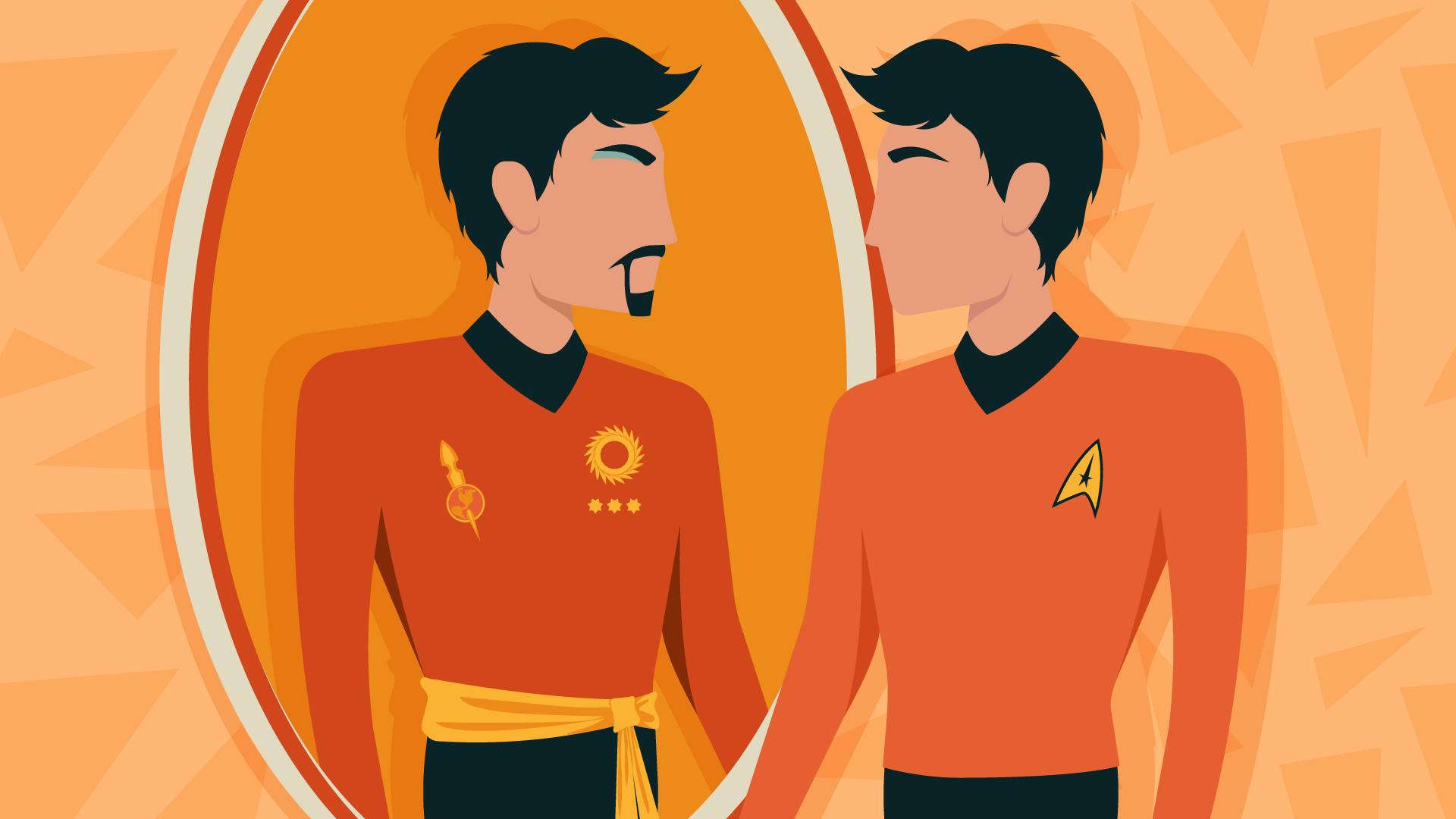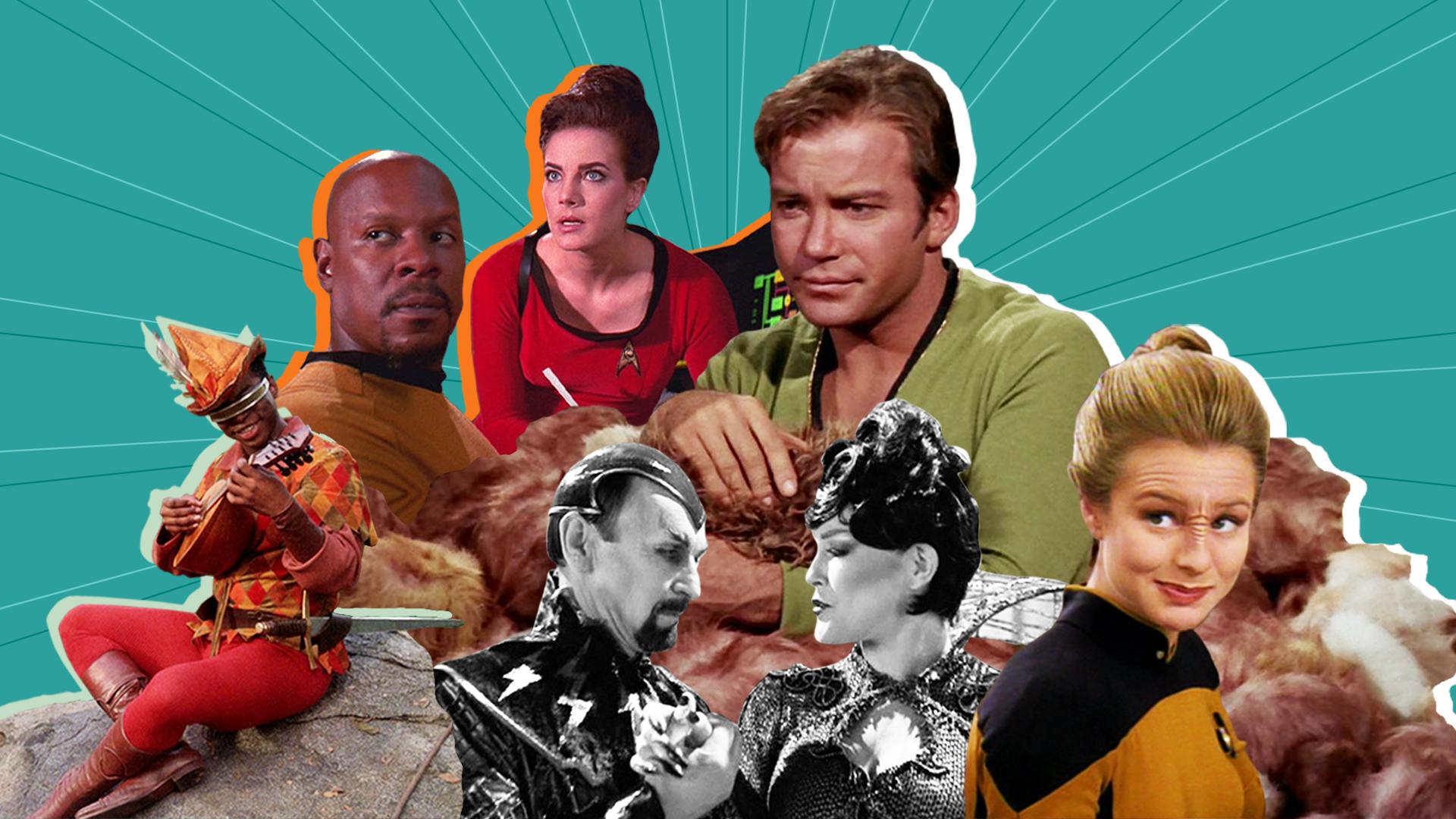Published Jun 7, 2023
What Does Passing Look Like in the 24th Century?
Using two episodes of Star Trek: Deep Space Nine, we examine what transitioning and passing look like in the Star Trek universe.
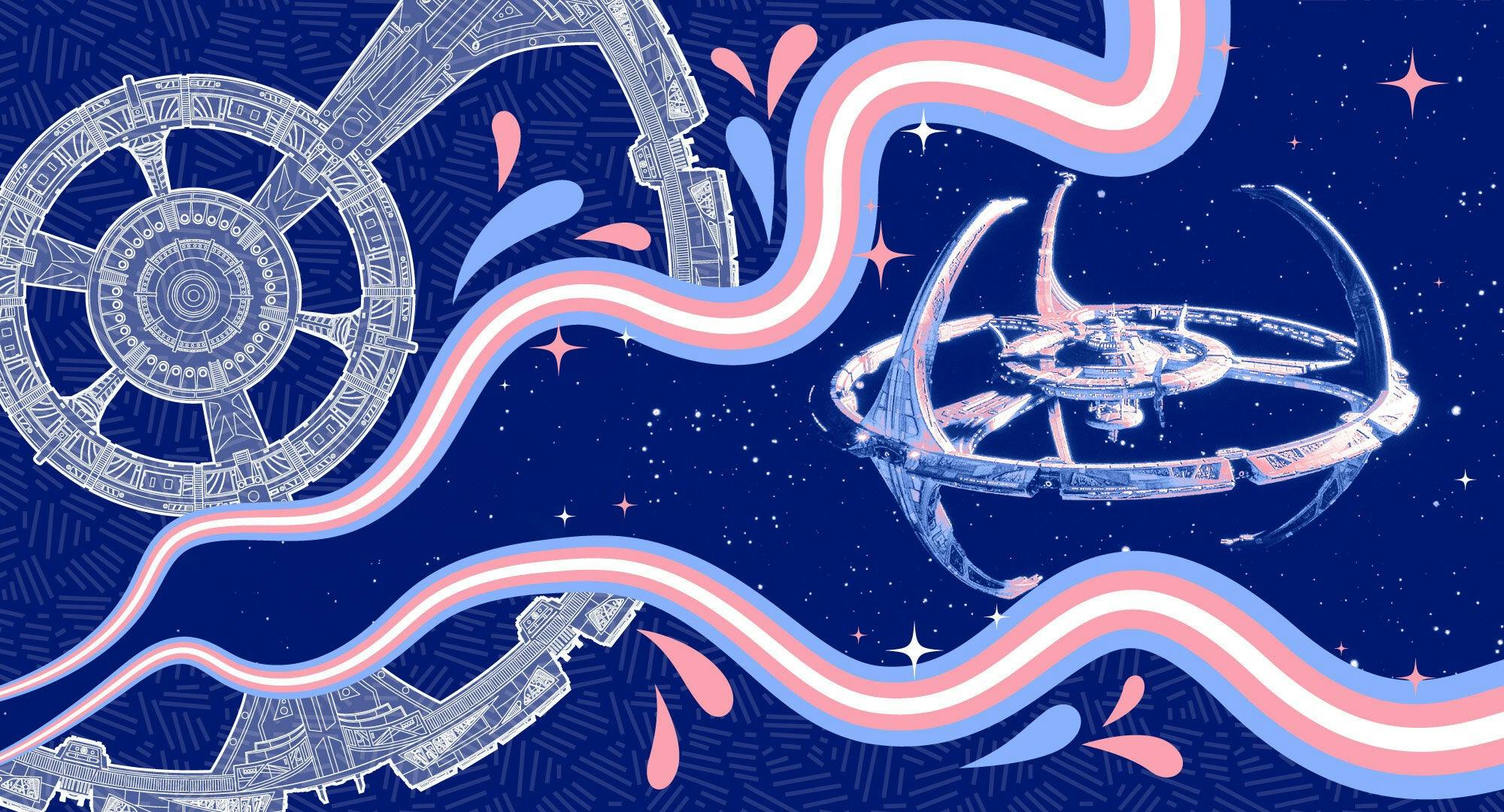
StarTrek.com / Rob DeHart
Danny Mallory Ortberg and Colette Arrand, two friends of varying transsexual types, sit down for a chat about Star Trek: Deep Space Nine's "Profit and Lace" and "Apocalypse Rising," and to ask what transitioning and passing would look like in the 24th Century.
Colette Arrand: Danny, after and how it serves as a kind of silent playground for queer desire, I kept thinking about other ways in which queerness, specifically with regard to trans people, lies just beneath the surface of Star Trek.
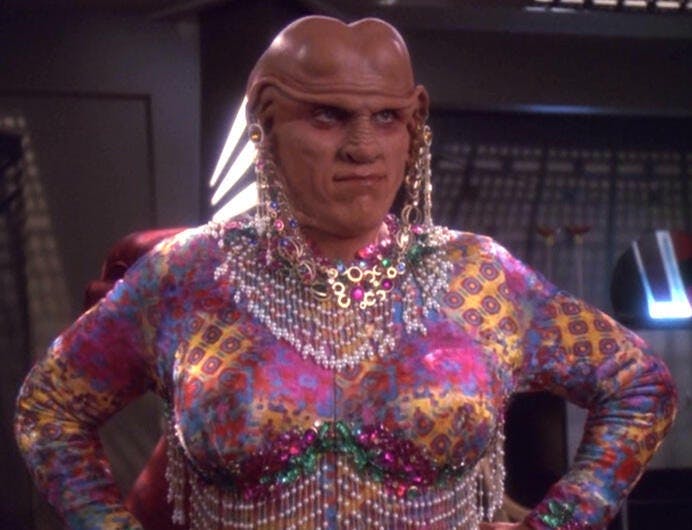
"Profit and Lace"
StarTrek.com
In that conversation, I said that visibly trans people aren’t kicking around in the 24th Century due to the ease with which one can obtain radical plastic surgery, which is a facetious way of commenting on the practice of casting (or not casting) trans actors and actresses outside of featured roles where their identity is central to an episode’s plot. I want to talk more about the role plastic surgery plays in Star Trek, and about passing anxiety as shown throughout the series, but first, I want to know — Where do you think all the trans folks have gone?
Danny Mallory Ortberg: I’d like to start by invoking a very important transsexual quotation, from the Star Trek: Deep Space Nine episode “Family Business,” between Rom and Quark
“Actually, all she has is a slight rash. Her skin’s still a little sensitive to clothing.”“That’s hardly an excuse not to serve her sons dinner.”
I know you want to focus on “Apocalypse Rising” and how often one of the main characters has to get, like, emergency Cardassian plastic surgery, but there’s something just so wonderful about the conceit of "Profit and Lace" – What if you had to become a woman because you gave your mother a heart attack from being such a terrible son?
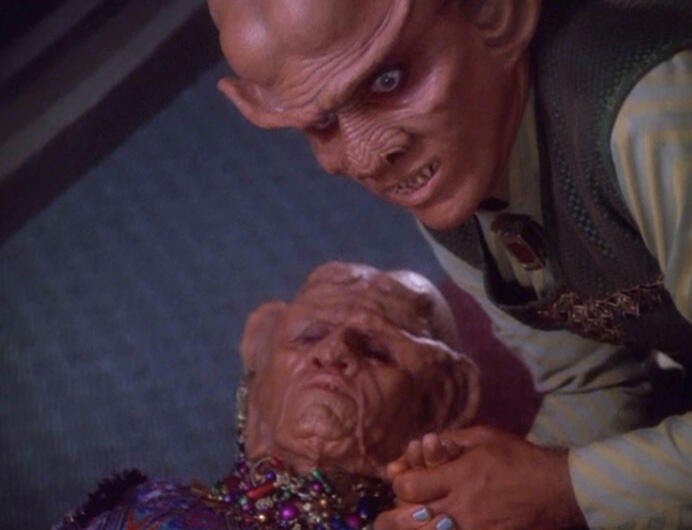
"Profit and Lace"
StarTrek.com
“What could be better than a hologram,” Quark asks. A temporary sex change, that’s what! And Wallace Shawn is there, my god, and then there’s a 30-second voice-training and comportment montage, and then it’s off to the lady races. The basic idea behind most TV temporary sex swaps or one-off crossdressing episodes is either:
1. Women try to pass as men in order to circumvent sexism; they probably shouldn’t have to but it’s plucky and spirited, or
2. Men try to pass as women, thinking at first it’s going to be easy, come to realize just how serious sexism is and just how difficult femininity is (they almost always have to go through a Femininity Council of their friends and family members crowdsourcing how they should walk, talk, etc), then come away from it learning a valuable lesson about how hard women have it.
The net result of such episodes is that temporary cross-sex identification might be valuable for breaking down sexism, but it should ultimately reinforce your assigned-sex – you should be a more thoughtful man for having briefly been a woman, or a stronger woman for having briefly been a man.
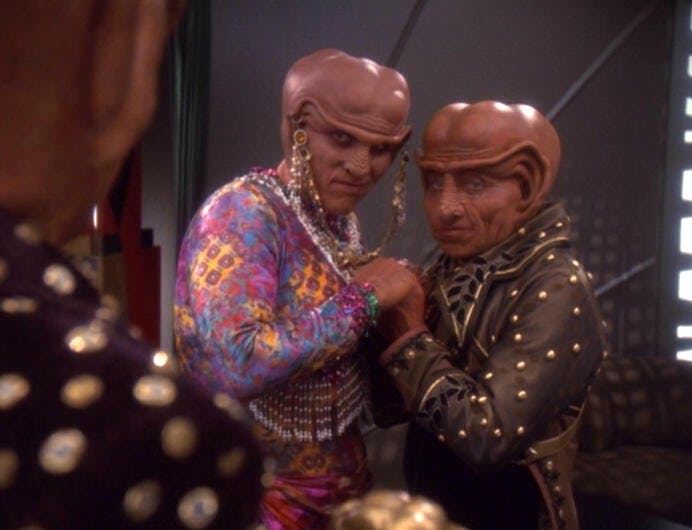
"Profit and Lace"
StarTrek.com
So when it comes to “Where have all the trans people gone,” I think at least in “Profit and Lace,” the answer is, “They’ve all sensibly detransitioned, and accepted that you can be a sensitive man or a masculine woman without going overboard about it.” A regressive answer for a progressive future!
Colette Arrand: Oh, “Profit & Lace.” That episode is not fondly spoken of by most of my friends who like DS9, but I love it and its similarly troublesome predecessor “Rules of Acquisition,” where a woman temporarily identifies as a man and reaps the rewards of being a man until her deception is revealed.
Somewhere between the Pel of one episode and the Quark of the other lies Rom, a sweet boy who knows a lot more about cross-dressing than anybody else in the station. The Ferengi relation to cross-sex identification is inherent to the kind of stories they used to tell. Pel’s time as a man and eventual outing and exile is tragic because she’s in love with Quark, and Quark’s brief time as a woman is a farce meant to demonstrate a regressive society’s slow awakening towards an eventual liberation of Ferengi women.
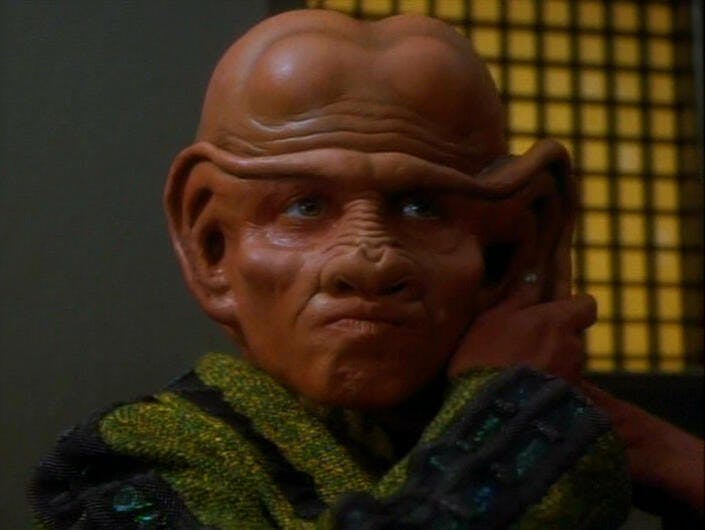
"Rules of Acquisition"
StarTrek.com
What “Profit & Lace” makes me wonder is that if it’s so easy for Quark to slip in and out of womanhood, why was Pel resigned to false ears and spirit gum? Given the other radical surgeries Julian Bashir has performed (like altering Worf’s brother Kurn’s appearance and wiping his memory), it feels less like the answer is that our siblings in the future detransition, and more like the idea that permanent transition is a kind of subterfuge beyond trying to trick a businessman into advocating for equal rights on Ferenginar. Thus, permanent transition is just beyond the realm of possibility for everybody beyond a Trill symbiote, who transitions out of biological necessity.
I hate that I’m thinking something sadder than “sensible detransition,” which is bad enough, but Deep Space Nine asks the question, “Do any of us truly know who we are?” a lot, and I can’t settle on the “Yes” the series often tends toward without thinking of poor Pel, marooned on the other end of the wormhole for who they are and who they fall in love with.
Danny Mallory Ortberg: Oh, Pel – I have such fondness for, and such resentment towards, our old buddy Pel. I think you’re right that it’s kind of hard to talk about transition as a single, unidirectional process in DS9 when instantly-transformative surgery is accessible, affordable, and universal; maybe it’s more correct to say that transition is unremarkable in that context.
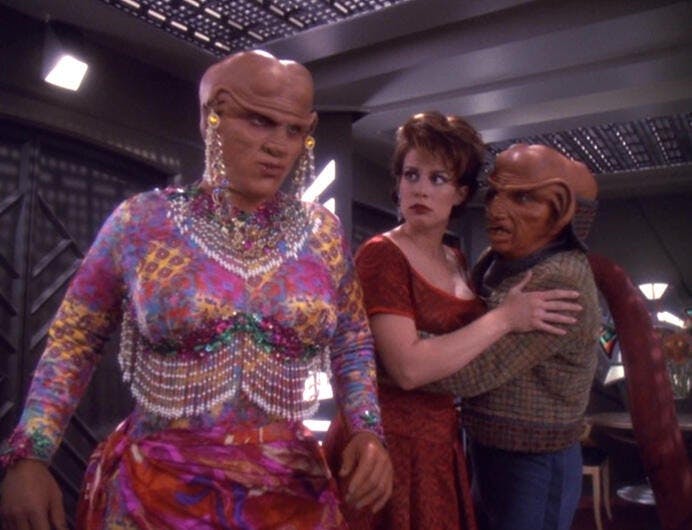
"Profit and Lace"
StarTrek.com
Colette Arrand: Maybe the one person transition wouldn’t be unremarkable for is Odo? “Apocalypse Rising” is the episode I wanted to focus on because the stakes for its temporarily transitioned characters are life-and-death for the whole quadrant, and their anxieties as to whether or not they can “pass” as Klingon in a room full of Klingons are, well, pretty familiar to how I felt about my ability to pass early in my transition.
But the real burden of the episode is placed upon Odo, recently transformed into humanoid form by his people for killing a Changeling. He has no idea who he is anymore, and he’s suddenly expected to be a Klingon. Before we focus on Odo or the idea of passing as a Klingon, maybe we should lay the groundwork for what we mean by “passing” in this conversation?
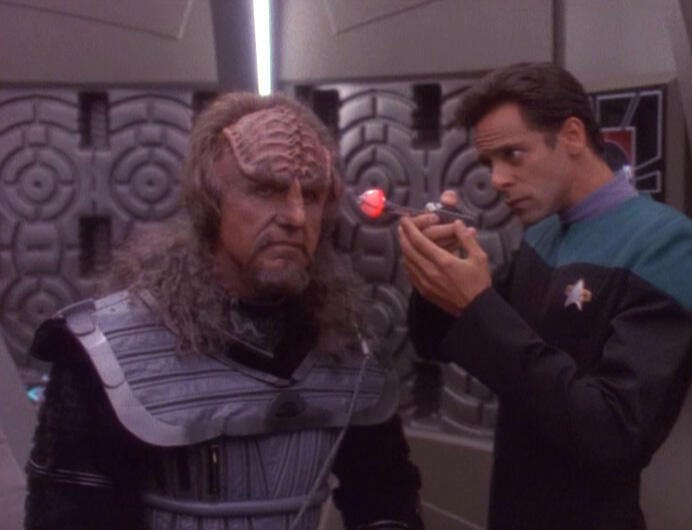
"Apocalypse Rising"
StarTrek.com
Danny Mallory Ortberg: Oh, let’s! I love, by the way, that Sisko and Odo have to pass before they can call someone out for passing in this episode. They have to look like Klingons, act like Klingons, but more than that, pass as specific Klingons with particular histories that General Martok is supposed to remember. The one person the Changeling-Martok can’t pass to or with is Odo; so even though everyone’s goal is supposedly to pass among Klingons, it’s Odo who finally reads him, because Odo recognizes his lapse in “Klingon honor” even before the Klingons do. And who can read us better than we read ourselves!
Colette Arrand: Right. The set-up for this episode is that Odo believes that Chancellor Gowron is a Changeling based on the circumstances of his exile. Starfleet assigns Sisko, Worf, O’Brien, and Odo to infiltrate an incredibly well-defended Klingon planetoid during the initiation rites of the Order of the Bat’leth. It’s not just that it’s a place occupied by Klingons that’s dangerous, it’s the fact that the most Klingon Klingons possible will be there, drinking and fighting all night before the ceremony. That’s where the idea of passing comes into play.
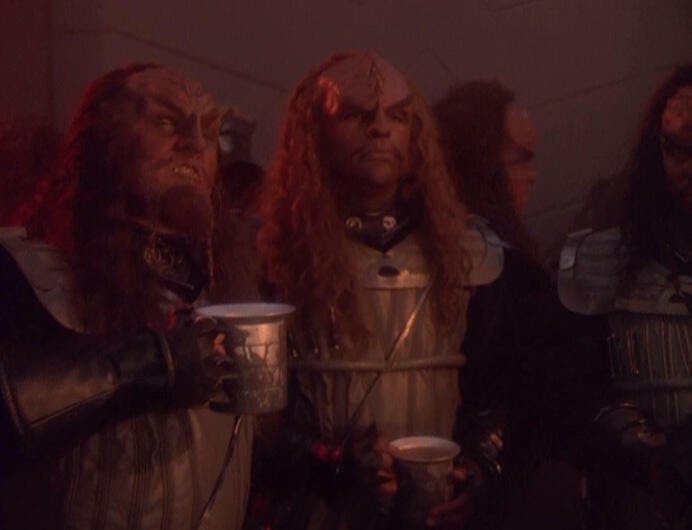
"Apocalypse Rising"
StarTrek.com
The simplest way I can think of defining “passing” is the ability to be perceived and accepted as a member of a given group. For a trans person, that ‘given group’ might mean cis-men or cis-women. Posing as a member of a different species is common enough in Star Trek, from Kirk infiltrating the Romulans to Archer posing as a Suliban, but “Apocalypse Rising” is an episode that demands a richer understanding of culture than one is given with a set of false ears. It isn’t enough that Sisko looks striking as a Klingon — he needs to know how to strike a Klingon in a way that’s not an invitation to a duel to the death. It’s interesting that you brought up “Profit and Lace,” because the scenes where Worf is teaching his crewmates how to “be” Klingon is pretty similar to the one where Quark’s family teaches him how to “be” a woman.
Danny Mallory Ortberg: Right, you’ve got to have buy-in from your passing pool (or you’ve got to submit to their standards of what counts as essential/normal, depending on how you look at it) before you go. And the question is always whether Quark or Sisko or whomever will be able to fulfill their mission before they’re compromised/caught — because you kind of have to get caught, in this kind of passing narrative. If I apply a more generous reading, maybe it’s more like — failing to pass will paradoxically lead to greater intimacy, greater rapport with whatever population you’re trying to pass as. But even then that rapport depends on a return to the previously-agreed-upon distance.
I worry I sound churlish! I don’t really expect full-throated, carefully-thought-out transfeminism from a DS9 episode about Changelings. I just wonder what a passing storyline might look like if passing-back weren’t the foregone conclusion.
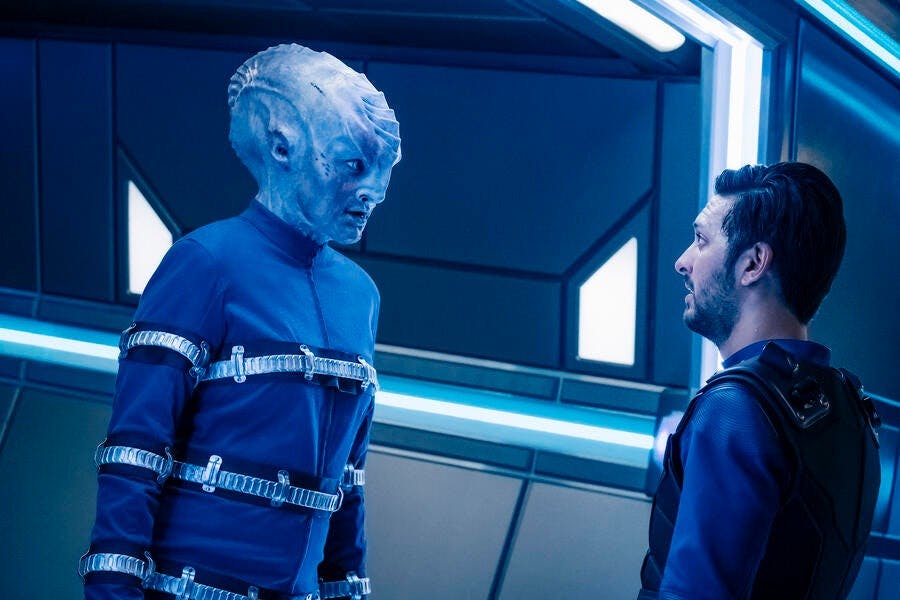
"The War Without, The War Within"
StarTrek.com
Colette Arrand: I don’t think you’re being churlish at all! But it’s hard to imagine a storyline where transition is the point, so far as that era of Star Trek is concerned. It’s pretty clear that there’s no passing-back in the future for Star Trek: Discovery's Ash Tyler, whose own surgically-aided Klingon-to-human transformation is not something he’s able to walk back, physically or culturally. And if you want to read Ash’s story as a trans one, then I guess there’s a note of tragedy there, too. In becoming human, he gives up his people, his lover, and his child. In return, he finds a new family in Starfleet/Section 31, but they know that he is/was a Klingon and are never going to extend him the benefit of trust as a result, which feels a lot like how characters in DS9 beyond the main crew treat Odo, come to think of it. The difference, so far as transition narratives go, is that Ash has the benefit of two seasons of character arc, and “Apocalypse Rising” is a single episode. One character will always have that anxiety, the other will end up okay because the mission was accomplished.
The more I watch DS9, the more taken I am with the Changelings and their relationship to Odo. It’s unavoidable for me! Like, the Founders are a race of people capable of imitating the most important people in the galaxy, down to details so minute, that it’s a miracle Odo fingers Martok as the Changeling in time. But when they appear to Odo, they do so as Odo appears to other humanoids, which is to say that they’re perfectly imitating Odo’s imperfect imitation of the Bajorans he’s grown up around. It’s a fascinating dynamic, and one I wish was explored in greater detail in DS9, but in this episode, it feels like his friends are frustrated with Odo’s newfound inability to shapeshift, like they took the malleability of his body for granted. It’s sad! Truly, deeply so. Worf is Worf, Sisko and O’Brien are on vacation, and poor Odo is in hell.
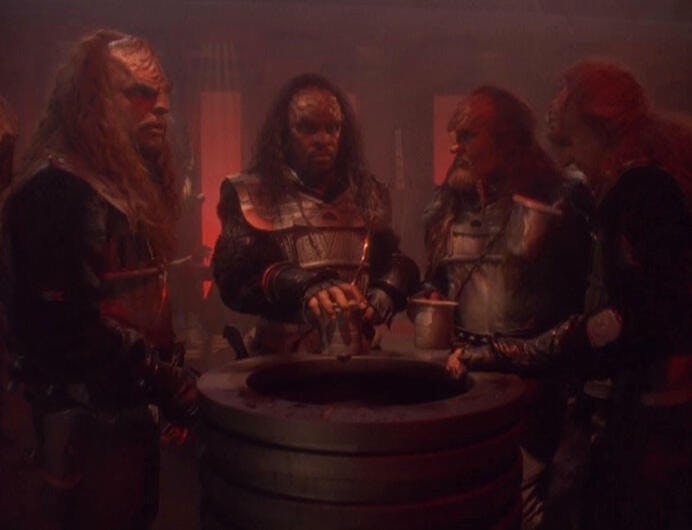
"Apocalypse Rising"
StarTrek.com
Maybe a glimmer of what you’re wondering is at the end of this episode, when Bashir tells Odo he can make him anything he wants and is refused? Is there bravery in Odo choosing to remain in a body that scans as dangerous to most of the people living in the Alpha Quadrant? Is bravery the point of that kind of story?
Danny Mallory Ortberg: Maybe “suffering” rather than bravery? (So pessimistic today!) It’s very Animorphs, where Changelings normally have to revert to their “true” gelatinous selves every 16 hours in order to sustain their composite selves. So it’s true that Odo ends up in a body that’s no longer flexible/changeable, but he’s also no longer bound by strict rules about reversion. Bashir, make me everything I want!
Colette Arrand: I’m already a puddle of goo for most of the day, so leave me as I am, doctor, unless I’m able to decide what it is that I really want. Right now, I’m okay with being liquid.
Danny Mallory Ortberg: The Alex Mack crossover DS9 always needed but never got.


